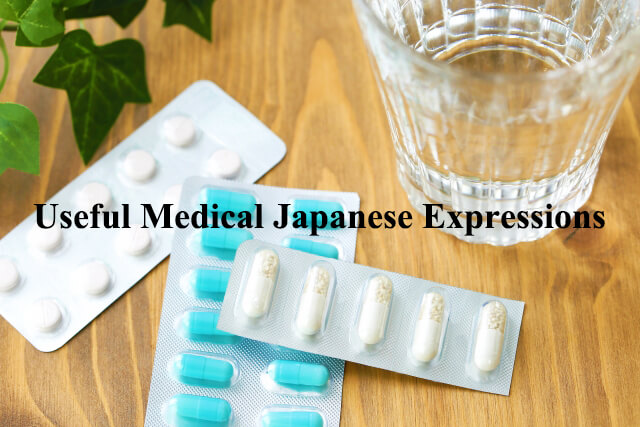
It’s unfortunate but there may come a time during your stay in Japan that you have to see a doctor. And it is very important that you know what to do and where to go if you are in need of a medical professional. Just in case you get sick while in Japan, here are some convenient words and expressions that you can use at hospitals or in drugstores. Keep in mind that this article is for non-emergency situations and if you have medical emergency, proceed directly to the nearest hospital, koban (police box), or dial 110 for the police and 119 for an ambulance.
-
01
Words and Phrases
1. Doctor: issha or sensei (医者/先生)
2. I don’t feel well: Guai ga warui desu (具合が悪いです)
This expression is best used when you find yourself suddenly feeling unwell. Once you seek medical professional or to those near you, use this phrase and ask for assistance.
A Common Mistake:
If you say, " Watashi wa byouki desu(私は病気です)” which means I’m sick in Japanese, it will most often be interpreted to mean that you have chronic illness, rather than meaning that you are feeling ill at that moment. When you are temporarily unwell, use ‘Guai ga warui desu’ instead.
3. Clinic: kurinikku (though just saying “clinic” in English is likely to be understood).
4. Hospital: byouin (病院)
5. Drug Store: yakkyoku (薬局)
A Common Mistake:
Pharmacies are different from drugstores in that they are a place that mainly handles medicine that was prescribed from hospitals or clinics. Drugstores have a wider variety of non-prescription medicine and it is more like a small supermarket-like store that is common in urban areas where you can buy over-the-counter drugs, cosmetics, food, and more. One of the most popular known drugstore in Japan is Matsumoto Kiyoshi. Look out for big yellow sign with its name.
6. Medicine: kusuri (薬)
I want medicine for ( ).
( )の 薬 を 下さい。
( ) no kusuri wo kudasai
7. Appointment: yoyaku (予約)
I'd like to make an appointment: Yoyaku wo onegai shimasu (予約をお願いします)
8. Prescription: sho-hou-sen (処方箋)
9. Medical insurance: hoken-shou (保険証)
10. I have medical insurance: Watashi wa hoken-shou wo motteimasu (私は保険証を持っています)
11. I don’t have medical insurance: Watashi wa hoken-shou wo motteimasen (私は保険証を持っていません)
12. I’m allergic to( ): Watashi wa ( )arerugi ga arimasu 私は( )アレルギーがあります![]()
-
02
Explaining Symptoms
1 My head hurts/I have a headache: Atama ga itai desu (頭が痛いです)
※Some frequent expression to remember to explain when you are in pain ◯◯ga itai desu ◯◯が痛いです
For example:
Nodo ga itai desu 喉が痛いです My throat really hurts
Ha ga itai desu 歯が痛いです My tooth hurts
Onaka ga itai desu お腹が痛いです My stomach hurts
2. I have a cough: seki ga demasu (咳が出ます)
3. I have a cold/I have a fever: Kaze desu, Netsu desu (風邪です、熱です)
When your body temperature is over 37°C (98.6°F), tell them: Netsu desu (熱です)
4. I feel dizzy: memai ga shimasu めまいがします
5. My nose is running: hana ga demasu 鼻が出ます![]()
-
03
How to go to the Doctor in Japan
If you would like to see a doctor, be sure to have your Japanese medical insurance card or any insurance document issued for your travel as many hospitals and clinics ask for them. (Medical fee will get expensive if you don't have an insurance)As many Japanese medical institutions do not accept credit cards, bring as many cash as possible. As long as you can pay, you will be accepted for the check up. Although many of the hospitals and clinincs have walk-in system, the waiting can take for hours. If anybody near you can translate for you, ask someone who can speak Japanese to help you book an appointment or ask for the estimate waiting time.
At the reception of the hospital/clinic, start the conversation like this:
“Sumimasen, guai ga warui desu (Excuse me, I do not feel well).”
すみません、具合がわるいです。
They will most likely ask you if you have an appointment and if this is your first time in their clinic, the conversation will keep on something like this.
“Yoyaku wa arimasuka? (Do you have an appointment?)”
予約 よやくはありますか。
“Iie (No)”
いいえ、していません。
“Hajimete desuka? (Is the first time?)”
初めてですか。
“Hai (Yes)”
はい、初めてです。
Then, you will be asked to fill out a questionnaire, most likely written in Japanese. However, here is a convenient multilingual medical questionnaire that you can download prior to your visit if you worry about how to fill them in.
When your turn comes, you will be called to shinsatsushitsu (the examination room 診察室) to see the doctor. Let the doctor know your condition. Be sure to let them know about your allergy prior to the examination.
I’m allergic to( ): Watashi wa ( )arerugi ga arimasu 私は( )アレルギーがあります
ex.
I'm allergic to (seafood): Watashi wa (gyokai 魚介) arerugi ga arimasu 私は(魚介)アレルギーがあります
I'm allergic to (pollen): Watashi wa (kafun花粉)arerugi ga arimasu 私は(花粉)アレルギーがあります
I'm allergic to (anesthesia): Watashi wa (masui 麻酔) arerugi ga arimasu 私は(麻酔)アレルギーがあります
Once your condition has been diagnosed, the doctor prescribes you some medicine or cold medicine. If your pain is severe, you will receive some pain killers.![]()
-
04
Useful Webpage for English-Japanese Medical Expressions
-
05
Medical & Insurance Needs
Anyone feeling ill after arrival to Japan or need multilingual support or want to apply for insurance, you should check Japan Tourism Agency's "Guide for when you are feeling ill". It is available in English, Chinese and Korean.
The Tokyo Station Hotel
1-9-1 Marunouchi, Chiyoda-ku Tokyo

-




 Go here
Go here










